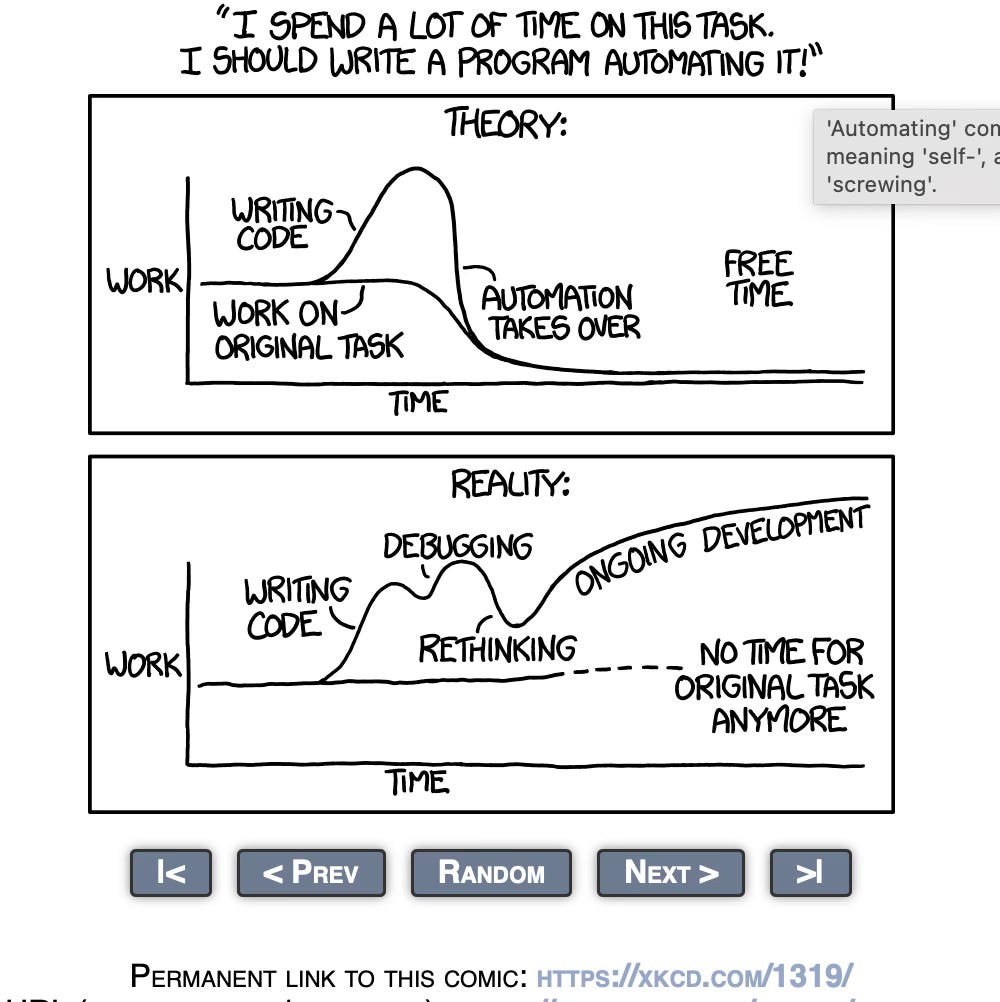Helpers, Handmaids or Hellions
Why we need time series data on AI Assistants, LLMs for learning and work
This post is a bit unlike some of my others. Essentially, I am going to offer some opinions by assuming facts not in evidence (for you lawyers out there). Here is the question, a serious one: how do we actually know that the use of large language model (LLM) assistants, are actually going to help us in learning and our work? This is a question about evidence, and ironically, about data that we do not have. Here is my thinking:
Let us say that one makes the case for the use of an LLM-assistant (ChatGPTx or CoPilot or whatever) to do some of the heavy lifting of writing for someone. A student say. That student is then to read the outputs, edit them, question them, etc. and come up with a better product through the symbiosis of the AI assistant and their own perspectives. But, if this is a student who does not possess the requisite knowledge of the facts, how can the student catch the hallucinations that are undoubtedly going to occur in that output? The student, after all, is not an expert.
Wait, wait… you object. The student has done some work and knows enough to use the AI assistant to her advantage. I’d like to put a pause on answering that objection for a minute.
Let’s take a case that may be easier… Let us say that a real life expert uses an AI assistant for her work, to speed up the process of writing some deliverable. The expert surely knows the relevant facts and can indeed edit the AI assistant’s outputs to correct for any incorrect or misleading hallucinations. The AI assistant works so quickly that it cuts the expert’s time on task down by, let’s just guess, by half. Sounds like a winner for productivity.
Yes, yes! You claim. That is exactly the kind of “augmented intelligence” we are seeking by utilizing the AI handmaiden. Ok, but what does the expert do with all of her copious amounts of new spare time? Does she go and read new articles or books about her subject? Why would she do that? Well, you say, to keep up her expertise.
But what if all her colleagues are also using AI to write their reports, articles, and books? Doesn’t matter you claim. They will have done the exact same thing our savvy expert has done, and checked the accuracy of their research.
Perhaps. But…. I’m a student of human nature as much as a student of ethics, technology and social science. Odds are… things get pushed without the due diligence we hope for or sometimes require.
Ok, so let’s go back to our student. She is an honorable and inquisitive student. She’s not trying to pass off work done by the AI in some rather underhanded attempt to not do the required work to achieve her grade and ultimately her degree (or diploma, etc.).
She uses her AI handmaiden to summarize topics for her, she uses her assistant to generate arguments or papers too. But she always edits them herself before submitting. How do we know that the student is really learning about the topics she studies?
Wait a second you claim. Students do this stuff all the time, already, like with Cliffs Notes. (Back in my day that’s what was used anyway… I know, I’m old. I still can spot a yellow and black Cliffs Notes cover across any room). So how is her AI-handmaiden any different?
Hmm… maybe it’s not. But I’d also wager that anyone who relies on Cliffs Notes for their entire education doesn’t exactly learn any subject deeply. They don’t master it. So, what? You say… she doesn’t need to be a master… or an expert. She just needs enough to get by.
Ding ding!
The question that I began with is actually a research question that to properly answer would require a large data study over a period of time. Why? Because the effects - and compounded effects - of AI handmaidens and helpers may not be actually seen cumulatively unless we have time-series data accounting for lags. In fact, a cursory look into some of the studies around student use is pretty bare on this account.
The time series part of this is crucial. Why? Because we cannot currently estimate the effects on populations of students and workers and experts without accounting for the fact that to do something other than “get by” requires more effort, time, exposure, work, reading, contemplating, writing, etc. than the the present use of these tools. But if we are singing the praises of these tools right now, we are doing so without the full picture.
On the one hand, you are drawing from a population of people who already have a lot of experience WITHOUT the AI handmaiden. So that population is going to be rather different than a population that is raised on using these tools. What is required is a control group and a test group… a population of people that do things “the good old fashioned way” and a population that is given the AI handmaiden … from the get go. And you will need to follow that population over time.
Presently, I see a lot of people espousing the belief that the AI assistant is really the ultimate handmaiden… without proof that it isn’t actually an AI hellion. What is more, to be able to assess the veracity and the effectiveness of your AI handmaiden requires knowledge already obtained.
The AI handmaiden is merely repeating back the knowledge it acquired through text consumption. But without careful consideration of how that knowledge re-enters the text filled world of the internet, that is, the co-constituting nature of this “knowledge” construction, we are actually faced with not merely model collapse, but knowledge collapse. We are faced with not merely stochastic parrots as our handmaidens, but we are faced with the creation of warm-blooded stochastic parrots too…
The Cliffs Note student of my time was not the student that excelled. That student was mediocre. Wait a second, you claim. There are certainly those students who used Cliffs Notes (and potentially their AI handmaidens) to actually bolster their work. They read the Illiad while also reading the Cliffs Notes Illiad alongside. So, you object, I’m making a bit of a mountain out of a molehill.
Maybe. But we are comparing Apples to Oranges if we use the objection. Why? Because Cliffs notes still took some time. You had to go out and buy them too. What is more, if we take the human psychology and behavioral science into the equation, we don’t have “automation bias” running amok with Cliffs Notes. We also don’t have another rather nefarious little thing…
The fact that even if humans were to use their AI-handmaidens to free up their time to pursue other projects or do other things, it is highly *unlikely* that they will actually be free to do them. Just because I have email, a dishwasher, a washing machine, a robot vacuum cleaner, or whatever, doesn’t mean that I am engaging in critical thinking and cultural pursuits. Nope. What tends to happen is that time freed creates more complex and additional work. I will cite as evidence the fact that various machines coming into homes from the 1950s onwards “freed up” time for women homemakers. In so doing, this led to a massive influx of women into the job market. (Let’s just assume that women’s entrance into the workforce during WWII also didn’t have anything to do with this, or the women’s rights movements.). Well… sure. Women entered into the workforce. But that doesn’t mean that they had less work.
I think my point here is that the assertions about what AI handmaidens will do for us are unfounded at this point. There needs to be time-series social behavioral science conducted on the effects of these technologies on learning, working, and living before we can assert with any reliability that they are helpers and not hellions. The impacts on our lives, at this point, can only be measured by analogy to other areas where technology has augmented, shifted, or changed how we operate. So, before you go all hog wild with AI handmaidens, take a beat and ask yourself - what is this going to really do for me? And how much time am I saving (if that is the real benefit).








Thank you for this piece. I have been making similar points in my institution (though not as eloquently). The point about compound effects if/when AI is adopted across the whole,e education system is critical.